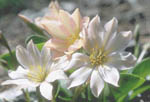Make love like the flowers

He picked a ranunculus which gently swayed its golden head above the grass beside him, and with infinite delicacy, slowly and amorously, he turned it between his fat red fingers, from which the dried blood scaled off in places:
"Isn't it adorable?" he repeated, looking at it. "It's so little, so fragile, and besides, it's all of nature; all the beauty and power of nature. It contains the world. A puny and relentless organism which goes straight to the goal of its desire! Ah, milady, flowers do not indulge in sentiment. They indulge in passion, nothing but passion. And they make love all the time, and in every fashion. They think of nothing else; and how right they are! Perverse? Because they obey the only law of life; because they are satisfied with the only need of life, which is love? But consider, milady, the flower is only a reproductive organ. Is there anything healthier, stronger, or more beautiful than that? These marvelous petals, these silks, these velvets ... these soft, supple, and caressing materials are the curtains of the alcove, the draperies of the bridal chamber, the perfumed bed where they unite, where they pass their ephemeral and immortal life, swooning with love. What an admirable example for us!"
He spread the petals of the flower, counted the stamens laden with pollen, and he spoke again, his eyes swimming in a comical ecstasy:
"See, milady; one, two, five, ten, twenty. See how they quiver! Look! Sometimes twenty males are required for the delight of a single female! He! he! he! Sometimes it's the opposite." One by one he tore off the petals of the flower:
"And when they are gorged with love, then the curtains of the bed are torn away, the draperies of the chamber wither and fall; and the flowers die, because they know well they have nothing more to do. They die, to be reborn later, and once again, to love!" Throwing the stripped peduncle away, he exclaimed:
"Make love, milady ... make love ... like the flowers!"
(Octave Mirbeau, Torture Garden, tr. Alvah C. Bessie, Dedalus, 1990, pp. 215-7)